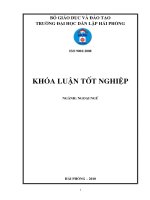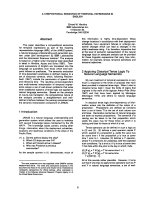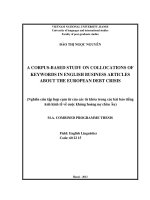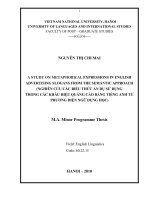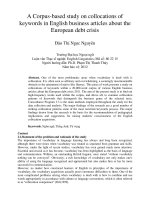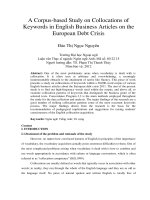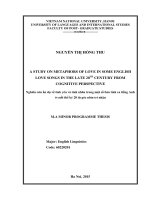FINAL ASSIGNMENT ON SEMANTICS NONCOMPOSITIONAL EXPRESSIONS IN ENGLISH
Bạn đang xem bản rút gọn của tài liệu. Xem và tải ngay bản đầy đủ của tài liệu tại đây (136.7 KB, 11 trang )
Non-compositional expressions in English
VIETNAM NATIONAL UNIVERSITY, HANOI
HANOI UNIVERSITY OF LANGUAGES AND INTERNATIONAL STUDIES
DEPARTMENT OF POST-GRADUATE STUDIES
FINAL ASSIGNMENT ON SEMANTICS
NON-COMPOSITIONAL EXPRESSIONS
IN ENGLISH
Post-graduate: ĐÀO THỊ NGỌC NGUYÊN - K17C
Instructor:
HÀ CẨM TÂM
Hanoi – 6/2010
Đào Thị Ngọc Nguyên – K17C
Page 1
Non-compositional expressions in English
INTRODUCTION
This paper does not pretend to be a thorough examination of every aspect of noncompositional expressions in English. Rather, it is an attempt to present the notion of
non-compositional expressions through an examination of different types of word
combinations, including idioms, collocations and clichés.
Within this study, by non-compositional expressions, I mean expressions that do not
follow the principle of semantic compositionality. Therefore, it is advisable to start the
paper with a brief discussion about the principle of compositionality in English.
1. The principle of compositionality
Compositionality or syntagmatic delimitation of lexical units (Cruise, 1986. 2000) is a
basic principle in grammatical semantics which claims that single meanings combine
together to form more complex meanings. That is to be said, we must interpret
utterances from our knowledge of the meanings of simple expressions and the
constructions used in combining them.
Its strong version (Cruse, 2000) says that “the meaning of a grammatically complex
form is a compositional function of the meanings of its grammatical constituents”.
The traditional view is that the relationship is fairly tight: the meaning of a complex
expression is fully determined by its structure and the meanings of its constituents—
once we fix what the parts mean and how they are put together we have no more
leeway regarding the meaning of the whole. This is the principle of compositionality,
a fundamental presupposition of most contemporary work in semantics.
“a red hat” = a + red + hat
“the girl is playing football” = the + girl + is + playing + football
Proponents of compositionality typically emphasize the productivity and systematicity
of our linguistic understanding. We can understand a large—perhaps infinitely large—
Đào Thị Ngọc Nguyên – K17C
Page 2
Non-compositional expressions in English
collection of complex expressions the first time we encounter them, and if we
understand some complex expressions we tend to understand others that can be
obtained by recombining their constituents. Compositionality is supposed to feature in
the best explanation of these phenomena. Opponents of compositionality typically
point to cases when meanings of larger expressions seem to depend on the intentions
of the speaker, on the linguistic environment, or on the setting in which the utterance
takes place without their parts displaying a similar dependence. They try to respond to
the arguments from productivity and systematicity by insisting that the phenomena are
limited, and by suggesting alternative explanations.
If we know what the words mean, using our knowledge of syntactic and semantic
rules we can work out the meanings of sentences, even ones we have not previously
encountered. The examples are based on Marchand (1969):
watchmaker writing table speech-writer
bookseller waiting room ironing board
The principle of compositionality, however, is not universally valid. The reason for
this is the existence of expressions not all of whose grammatical constituents
contribute an identifiable component of its meaning. Think of phrases like a white
elephant: knowing what white means is no help whatsoever in decoding the meaning
of white elephant. (In Oxford Advanced Learner’s Dictionary, while elephant is
defined as a thing that is useless and no longer needed, although it may have cost a lot
of money. Consider the following example: The new office block has become an
expensive white elephant.)
Such combinations are considered non-compositional expressions; within this study,
non-compositional expressions in English include: idioms, collocations, and clichés.
2. Idioms
An idiom is an expression whose meaning is not compositional-that is, whose
meaning does not follow the meaning of the individual words of which it is composed.
Đào Thị Ngọc Nguyên – K17C
Page 3
Non-compositional expressions in English
For example, the English phrase to “kick the bucket” means to die. A listener knowing
the meaning of “kick the bucket” will not thereby be able to predict that the expression
can mean to die. Idioms are often, though perhaps not universally, classified as figures
of speech.
Idioms typically admit two different interpretations: pure idioms and figurative
idioms.
Pure idioms are fixed word combinations that have been established through continual
use over time. They are non-compositional in meaning, and do not permit substitution
of words by similar words. Figurative idioms are those phrases that have both a literal
and a non-compositional (figurative) meaning. The figurative interpretation is the
more common, and the literal one is seldom, if ever, applicable.
Continuing with the previous example, when we say that someone kicked the bucket,
we usually mean that the person died. However, in certain contexts, we could intend
this to mean that someone literally kicked some bucket.
Below, I give some examples of idioms in English with explanations of their origins
or meanings followed.
To let the cat out of the bag
This idiom was probably originated in English marketplaces many years ago. Traders
would put a cat in a bag and would try to deceive possible customers by saying it was
a pig. People would buy the bag without close inspection of the contents, but then they
would let the cat out of the bag and realize that they had been deceived, which is the
meaning it has nowadays.
To be born with a silver spoon in one's mouth
This expression is used to refer to a member of a wealthy family. It was probably
originated from an old custom whereby godparents used to present the child at the
christening with a silver spoon.
Đào Thị Ngọc Nguyên – K17C
Page 4
Non-compositional expressions in English
Never look a gift-horse in the mouth
This is an old saying and it's related to the way that a horse's age is calculated: by
looking at its teeth. The expression now means that you should accept a received gift
without trying to find a fault in it.
Dressed to the nines
This may come from an alteration of "dressed to the eyes", which was written in Old
English as "to then eyne". The letter n of then was removed and moreover, eyne was
changed to nine. Another explanation is that the number ten is considered the ultimate
point of perfection. Therefore, if someone is dressed to the nines, he must look really
smart.
It's raining cats and dogs
This is a very old expression linked to the ancient beliefs of sailors and also to Norse
mythology. Cats were associated with heavy rain and dogs with storms and wind.
Therefore, this expression was used to refer to severe rainstorms. Nowadays, it has
become old-fashioned.
To catch someone red-handed
This meaning of this idiom is "to find someone when he's doing something wrong". It
alludes to the discovery of the murderer so soon after committing the crime that blood
is still on his hands.
To bury the hatchet
This comes from the American custom of burying hawks and other weapons as a sign
that hostilities between the American Indians and the White had ended. Nowadays,
this idiom is used to refer to coming to peaceful terms with an opponent.
3. Collocations
Đào Thị Ngọc Nguyên – K17C
Page 5
Non-compositional expressions in English
The term ‘collocation’ was first introduced by Firth (1951). On defining the level of
meaning created by word combinations or patterns, he stated ‘You shall know a word
by the company it keeps’ (Firth 1957).
Consider this example:
What time is it?
I don’t have the time to go to the party.
It is almost time to go to the airport.
I’ve done the same mistake time and time again
We should get there in time for the start of the meeting.
It can be observed that the word ‘time’ has many senses, but the surrounding words, or
‘collocation’ signals the sense being used. It could also be said that the sense in which
‘time’ is used determines the surrounding words.
Halliday (1966) and Sinclair (1966) introduced the notion that patterns of collocation can
form the basis for a lexical analysis of language alternative to, and independent of, the
grammatical analysis.
Whatever definition the term ‘collocation’ may be provided by different linguists,
collocations, basically, are words which often go together to produce nature-sounding
speech or writing. However, as collocations and idioms share the characteristics of
having arbitrary restriction on the commutability of the elements in word
combinations, it is of significance to make any possible distinction between
collocations and idioms.
The distinction between collocations and idioms, in turn, may be recognized
through an examination of three factors determining the categorization of a lexical
combination in English language. These factors are the degree of probability that the
items will co-occur, the fixity of the combination (i.e. grammatical restrictions), and
the degree to which the meaning of the combination can be derived from the meaning
of its constituent parts. Based on the three factors, a continuum on which the lexical
Đào Thị Ngọc Nguyên – K17C
Page 6
Non-compositional expressions in English
combinations placed can be proposed. The continuum suggested by Woods (1981) is
from the least predictable combinations to the fixed ones: idioms – collocationscolligations- free combinations.
Idioms, on the continuum, stand at one end of the cline. They seem to be definable
both from their semantic characteristics and the fixity of their constituents. They are
seen to function semantically as a single unit and tend not to allow for substitution of
their elements, nor for grammatical or syntactic alterations. Collocations, standing
after idioms in the cline, are presented as ‘roughly predictable...yet restricted to certain
specified items’.
For example:
Free combination
Collocation
Idiom
want a car; read the paper
shrug one’s shoulder; make a decision
sweeten the pill; kick the bucket
Kjellmer (1994) regards idioms as a ‘subcategory of collocations’ and defines idioms
as ‘a collocation whose meaning cannot be deduced from the combined meaning of its
constituents’.
In the following part examples of ‘happy’ collocations in English will be presented as
an illustration for various interpretations a word may have when combined in different
collocations.
‘Happy’, when combines with a word that has the feature ‘human’ like ‘child’ or
‘family’, reveals the sense of enjoying pleasure, contentment or joy. A happy child,
therefore, is a child who enjoys or has happiness.
In such phrases as a happy mood, a happy frame of mind, a happy smile, a happy
face, ‘happy’ suggests the expression or refection of happiness.
‘Happy’ can convey the meaning ‘giving or causing pleasure’. A happy marriage,
a happy childhood, a happy life, a happy memory or a happy retirement are those that
make you feel happy because there are enjoyable things happened.
Đào Thị Ngọc Nguyên – K17C
Page 7
Non-compositional expressions in English
In other collocations such as a happy coincidence, a happy accident, a happy
experience, a happy position, or a happy land, ‘happy’ becomes synonymous with
‘lucky’, ‘fortunate’, or ‘providential’.
When combined with words that have the feature ‘discourse’ such as ‘story’ or
‘report’, ‘happy’ roughly means ‘containing a happy event or events’ .
Also, ‘happy’ can go with nouns denoting words, ideas, or behaviour, formally
stressing the suitability and appropriateness of words, ideas, or behaviour for a
particular situation. A happy turn of phrase is especially well expressed and to
the pointed. A happy choice and a happy advice, similarly, meet the
requirements of a purpose or situation. Synonyms of "happy" in this sense
include "suitable", "appropriate", and "felicitous".
4. Clichés
A cliché (from French name cliché) originally was a printing term for a semipermanently assembled piece of type which could easily be inserted into the document
being printed. It has come to mean a phrase, expression, or idea that has been
overused to the point of losing its intended force or novelty, especially when at some
time it was considered distinctively forceful or novel. By extension, "cliché" applies
also to almost any situations, subjects, characterisations, or objects that have similarly
become overly familiar or commonplace. Their meanings may also be misunderstood
leading to them being often misused. As a result, many feel that they should not be
used and are seen as an indicator of lack of creativity, innovation, or sincerity.
Because the novelty or frequency of an expression's use varies between different times
and places, whether a given expression is a cliché depends largely on who uses it and
who makes the judgment.
On the other hand, there can also be advantages to using clichés. The use of a cliché
that is well known to the audience can help keep the storytelling on a fast pace without
as much explanation and elaboration. They can also help in connecting with the
audience by showing them something with which they are familiar or can relate to.
There are some characteristics among clichés:
Đào Thị Ngọc Nguyên – K17C
Page 8
Non-compositional expressions in English
They don't need to be decoded globally.
These phrases are stored as complete units in the brains, being easy to retrieve and
easy to decode.
Their propositional features of truth or falseness are never seriously examined,
functioning as discourse markers.
Followings are some common illustrated examples of clichés in English:
‘I’m sure about this.’
‘Ladies and Gentlemen’
‘I won’t take no for answer.’
‘As far as I’m concerned’
‘Behind the clouds, the sun is shining.’
‘I will survive.’
‘Making a bad decision is better than making no decision at all.’
‘You get nothing for free.’
‘No pain, no gain’
‘It’ll feel better when it stops hurting.’
‘Goodbye is not an easy word to say.’
‘Parting is such sweet sorrow.’
‘Love hurts.’
‘One lost, ten found’
‘The sun in your eyes made some of the lies worth believing.’
‘Truth is nothing but a feeling that something is true.’
Đào Thị Ngọc Nguyên – K17C
Page 9
Non-compositional expressions in English
CONCLUSION
In all kinds of text, non-compositional expressions are essential, indispensable
elements with which our utterances are very largely made; and even very advanced
learners can often make inappropriate word combinations.
For English learners, non-compositional expression is an important part of the
language to be mastered. This is also an area which ‘resists’ tuition, and, therefore,
requires special and systematic attention.
Đào Thị Ngọc Nguyên – K17C
Page 10
Non-compositional expressions in English
REFERENCES
1. Kjellmer, G. (1994). A Dictionary of English Collocations. Clarendon Press.
2. Lyons, J. (1995). Linguistics Semantics: An Introduction. London: CUP
3. Larson, R and G. Segal. (1995). Knowledge of meaning: an introduction to
semantic theory. Cambridge. MA
4. Firth, J.R. (1997). Modes of meaning. Oxford University Press.
5. Cruse, A. (2000). Meaning in language. Oxford University Press.
6. Oxford Collocations Dictionary for Students of English. (2002). Oxford
University Press.
Đào Thị Ngọc Nguyên – K17C
Page 11

